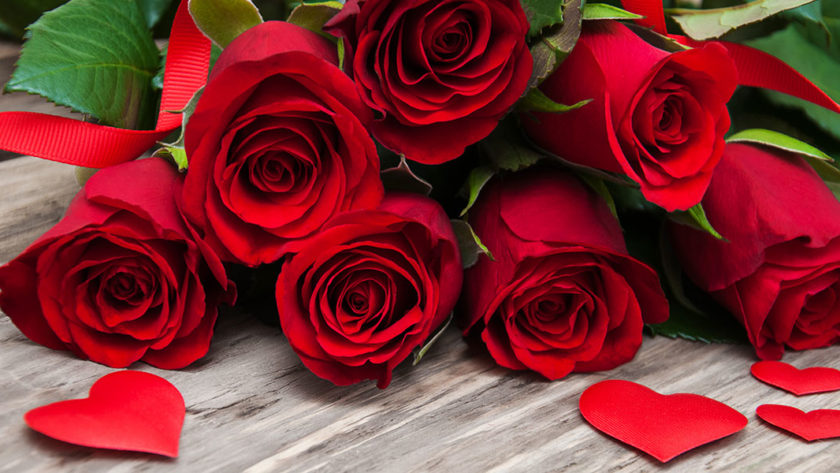The red rose has been regarded as the ultimate symbol of love for centuries, so it’s unsurprising that the most romantic flower features in myriad myths and legends.
With Valentine’s Day fast approaching, now seems like the perfect time for a spot of soppy storytelling. From the tragic demise of Adonis in the arms of Aphrodite to the Hindu god Vishnu forming his wife from rose petals, this year, you can head off for date night armed with some amorous fairy tales to share.
What’s in a name?
The rose is said to have been created by Chloris, the goddess of flowers, after she transformed her favourite nymph’s lifeless body into the most stunning, most fragrant bloom imaginable. Such was its magnificence that all of Mount Olympus declared it the queen of flowers, with Mars, the god of war, gifting it thorns for protection.
Have you ever noticed that ‘rose’ is an anagram of ‘Eros’, the Greek god of love? That’s because his mother, Aphrodite (more on her to come), named the flower in honour of her son after being wowed by its timeless beauty. Eros, later known as Cupid by the Romans, famously made people fall in love by shooting arrows into their hearts – and what better arrows than the thorns of his namesake rose?
If roses are good enough for the gods, our bunch of 100 red roses will go down a treat with your loved one this Valentine’s Day.
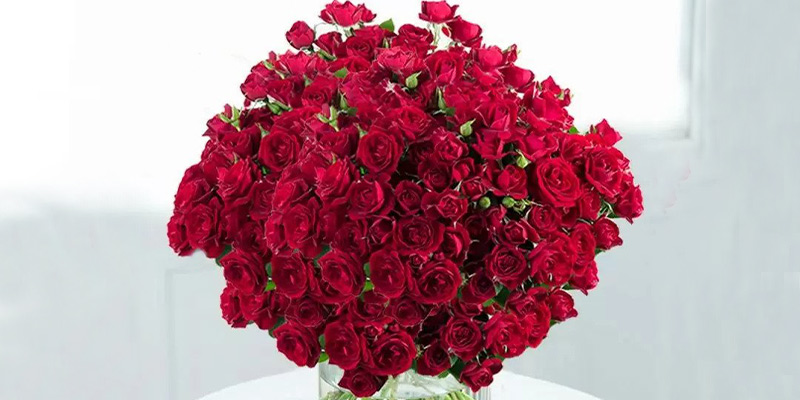
Blood, tears and roses
One of many brutal Greek myths tells how Aphrodite, the goddess of love, was distraught to hear of a murder plot against Adonis, her mortal lover. In a desperate attempt to warn him, she ran through bushes of white roses and pricked her ankles on their thorns. Her blood dyed the petals red, giving the red rose its meaning of eternal devotion.
Sadly, Aphrodite found Adonis too late; he had been gored by a wild boar and died in her arms. Her tears mixed with his blood and sprung into a rose bush.
A goddess made from rose petals
Hindu belief holds that the rose played a starring role in creating mankind. One day, the gods Vishnu and Brahma were arguing about which flower was the most beautiful. Vishnu fervently favoured the rose, with its unmatched shape and scent, but Brahma had never seen one before and therefore chose the lotus. To persuade Brahma of the rose’s superiority, Vishnu presented one to him and instantly succeeded in his aim.
Utterly enchanted by his new floral discovery, Brahma conjured up a bush of 108 large roses and 1,008 small roses. Later, Vishnu would form his bride, the goddess Lakshmi, from rose petals taken from this shrub.
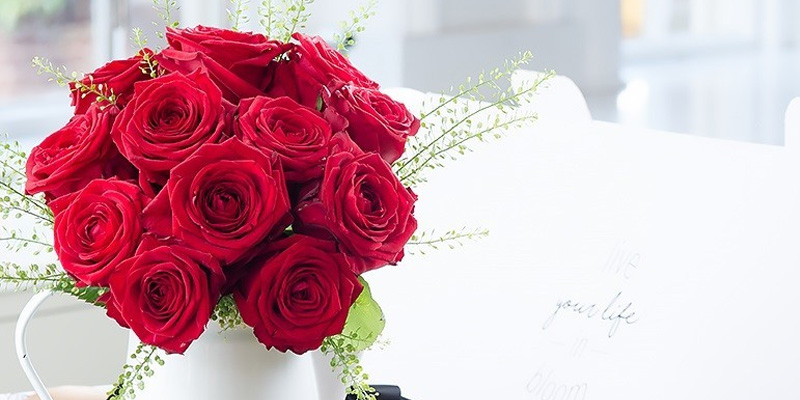
To kill a nightingale
It isn’t only gods who fall in love with roses. One ancient Persian legend tells how a nightingale was struggling to sing until it came across a delicate white rose. The little bird fell passionately in love with the flower and, inspired by its devotion, burst into heavenly song. Upon hearing the nightingale’s tune, the rose became equally as besotted, and from then on would only bloom when it began to sing.
Their love intensified to such an extent that the nightingale pulled the rose so close to its chest that a thorn pierced its heart. Its blood turned the white petals red, giving the newly red rose its meaning of passion.
The marriage of Cupid and Psyche
When Venus, the Roman goddess of love, heard that people had begun worshipping a beautiful mortal princess called Psyche over her, she grew jealous. In her rage, Aphrodite cursed Psyche to fall in love with the ugliest and most unworthy of all men – an order she tasked her son Cupid with fulfilling.
Fortunately for Psyche, when Cupid laid eyes upon her, he fell deeply in love and refused to punish her. When Aphrodite found about their forbidden romance, she was furious, but Jupiter, the king of the gods, took pity on them. He made Psyche the goddess of the soul, declared that she and Cupid would be wed, and scattered red roses across the Earth in celebration. Eventually, Aphrodite calmed down, but talk about a nightmare mother-in-law…
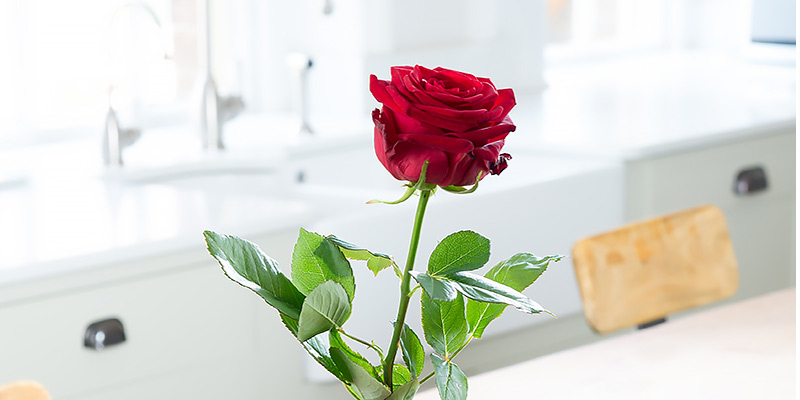
A rosy disguise
The Greeks gods are infamous for their lack of respect for women, and Zephyrus, god of the west wind, was no exception. This arrogant deity fell in love with Flora, the goddess of flowers, and decided he wanted to kiss her. Unfortunately for Zephyrus, Flora was only interested in flowers. To catch her attention, he turned himself into her favourite bloom, the rose. Sure enough, when Flora saw Zephyrus in his alluring disguise, she kissed him. Sigh.
Yellow for jealousy?
OK, so this story is the opposite of romantic, but it goes some way to explaining why yellow roses aren’t as popular as their red and pink counterparts on Valentine’s Day!
While away at war, Prophet Muhammad, the founder of Islam, was plagued with worry that his wife, Aisha, would cheat on him. In his anguish, he called upon the archangel Gabriel for advice. Gabriel told him that when he got home, he should order Aisha to drop whatever she is carrying into the nearby river. If it kept its colour, she had been faithful; if it changed colour, she had committed adultery.
Sure enough, when Aisha approached her returning husband with a big bunch of red roses, Muhammad did as Gabriel had instructed. The flowers turned yellow, realising his worst fear, but after an intervention from Allah declaring Aisha’s innocence, he forgave her.
Yellow roses have long symbolised jealousy, but today they are most commonly linked with joy and positivity (as in our Happiness bouquet), making them a thoughtful choice for a friend in need of a pick-me-up.
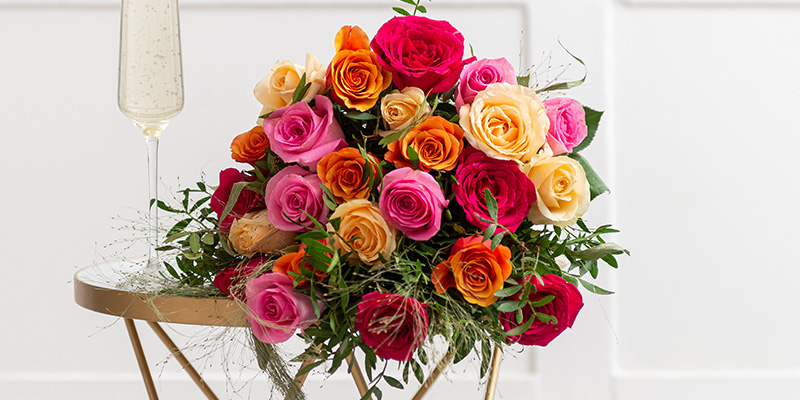
How to give red roses
Inspired to send red roses to your belle or beau this Valentine’s Day ? If so, they may read into the number of blooms in their bouquet! Here’s a quick guide to the meanings these numbers have taken on over the years:
- A single red rose: Love at first sight, “I love you’”, or “You are still the only one”
- Three red roses: “Me, you and our shared love”
- Six red roses: “I want to be yours”
- 10 red roses: “You’re perfect”
- 12 red roses: “Be mine”
- 15 red roses: “I’m sorry”
- 24 red roses: “I’m yours”
- 50 red roses: “My love for you knows no bounds”
- 100 red roses: “I will love you for 100 years”
From traditional roses to alternative bouquets, our new range of Valentine’s Day flowers is sure to impress your loved one. Shop now and score some serious brownie points come 14th February.


